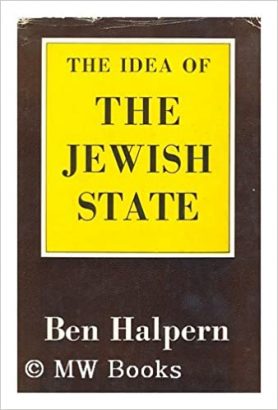Donna Robinson Divine is Morningstar Family Professor of Jewish Studies and Emirita Professor of Government at Smith College. The Idea of the Jewish State by Ben Halpern (her teacher at Brandeis) examined how the idea of the Jewish state had evolved from both Zionism’s struggles with the currents of global politics in nineteenth and early twentieth century Europe and from Jewish divisions over how to proceed as the world they all knew was ending. The book, argues Robinson Divine, reads ‘less like a dispatch from another century than a mirror of the landscape inhabited today.‘ She notes how the current rekindling of the Diaspora as the site for a Jewish identity, to be forged in a tolerance and justice presumed to be unavailable in a Jewish state, is at odds with Halpern’s assertion that, ‘since the rise of Israel, outright opposition to the existence of a Jewish state is no longer recognized by the consensus of the Jewish community as a legitimate attitude.’
By the time The Idea of the Jewish State was published in 1961, Ben Halpern had already made his name. Accompanying a group of Brandeis University students invited to meet with David Ben-Gurion that same year, the Prime Minister interrupted the introductions to exclaim — האם זה באמת אתה בן הלפרן –‘Is this really you, Ben Halpern?’ In the New York Times, no less a master of Jewish history than Salo Baron described Halpern as an academic avatar before bestowing praise on his book.
Ben Halpern was my teacher at Brandeis. What I know about Zionism and Israel started with the material between the hardcovers of his 1961 book The Idea of the Jewish State. Returning to the beloved books of youth risks disappointment even if much of what is recorded in them is already deeply implanted. I carried what Ben Halpern wrote inside of me from the moment I embarked on my own independent studies of Israel. And while it may be hard to overstate the influence of a book that still appears regularly in the footnotes of academic work on Israel and Zionism, it is useful to ask whether the claims it set forth still hold true given the enormous expansion of the library of academic studies in this field.
The Idea of the Jewish State is really an account of how ideas can change history. Halpern deconstructs Zionism’s notion of sovereignty forged at a time when Jews were full of doubts and disagreements about how to cope with the multiple crises they faced. Moved by the terror of disintegration, Zionism was also animated by the possibilities of transformation. Emerging in an era of political upheaval, Zionism developed within disagreements that now sound less like a dispatch from another century than a mirror of the landscape inhabited today. And of course, the explanations Ben Halpern set forth in this volume have been debated, refined, but largely, I contend, confirmed. Let me count the ways.
Zionism sought to convince Jews to take responsibility for their lives and for their national community. That such a goal would lead to embracing the goal of statehood took hold slowly for some but quickly for others. Sovereignty would resolve what was, to use the language of the era, ‘the Jewish problem’, shorthand for the fear that because Jewish life in many parts of the world was ‘poor, nasty, brutish, and short’, the Jewish people was in desperate need of a political theory to chart its way out. But as Halpern tells, in fine-grained detail, because Zionism joined its political struggle to what were almost certainly unrealisable if noble ambitions, the Jewish state envisioned was not intended to possess the sovereignty on offer from a Thomas Hobbes. Rather, it was to embody a series of obligations, among them the need to live up to the country’s founding principles.
Halpern was surely correct in noting that how Jews conceived of their future had everything to do with how they understood their circumstances in the present, even as they drew on core tenets of their heritage. Perhaps because Israel was imagined long before it was founded—images conjured in the religious canon, in utopian fantasies, and in political treatises—Zionism could never be fully free from the initial debates over core principles and values. The creation of a culture whose literature and ideas were expressed in Hebrew and whose ancient laws and rituals could be translated into national traditions was the foundation for both a liberation Zionists sought from oppression and for a state offering Jews something Zionists believed could be found nowhere else—the opportunity to take advantage of the modern world.
Once again to follow Halpern’s general argument, it was Zionism that gave voice to the power of the imagination not simply to reinterpret history but more importantly, to change it and create a radically different future for Jews. Substituting action for prayers gave Zionism its purpose. Work, rather than textual study, would be the vehicle for legitimising possession, creating community and for transforming sites holy in scripture into a real-life place to call home. Zionists were builders, empowered less as individuals than as members of a kind of collective construction team.
Halpern gives us a powerful reading of how marginal Zionist visions initially seemed given the fevered temper of the times and what appeared the unbridgeable divisions among Jews about what must be done. An Enlightenment beckoned Jews to become full citizens and to ignore its potentially corrosive consequences for a civilisation with an ancient lineage. Jews responded by radically revising their own traditions and organisations to create compatibility with modern trends promising freedom and opportunity. Thus did religious reformers revise doctrines, rituals, and liturgy to introduce new styles of Jewish worship and identity.[1] Those opposed to such innovations bulldozed their opponents by advocating a doubling down on religious beliefs and observance — the only means, the newly named Orthodox insisted, of halting collective Jewish decline, if not its disappearance.[2] All groups contended with proponents arguing for totally dissolving the Jewish lifestyle, erasing all differences as a prerequisite to eliminating any basis for discrimination and hatred. When high hopes for full acceptance remained beyond reach — Enlightenment thinkers were often tone-deaf to their own anti-Semitic murmurs—some Jews embraced revolution, promoting the promises of radical socialism or anarchism. As Halpern put it:
Not only was the uniformity of Jewish religious practice and the universality of Jewish communal organisation now challenged, but the transmission of Jewish culture which supported the whole structure of traditional Jewish unity became increasingly ineffective. In the aftermath of Enlightenment and Emancipation, the Hebrew language and traditional Jewish education ceased to be the universal heritage of Jews in the West and no longer served as channels of communication accessible to all Jews. [iii]
None of these responses to modernity did much to stop the feeling of many Jews that their collective future was spinning out of control, even imparting an aura of apocalypse when more than two million Jews from Eastern Europe began their march west. The numbers overwhelmed almost all philanthropic systems at every transit point, delivering too many people into a bureaucratic labyrinth and massive suffering. Trouble mounted as staggering numbers of poverty-stricken migrants gathered in urban slums, traumatising citizens across Western Europe and leaving Jews with more fears and more anxieties about their fate. Emigration unsettled families while political and economic changes disrupted customs and relations once taken for granted as eternal, raising the possibility that a collective Jewish existence would disappear.[4]
Fragmentation and disunity convinced Zionists that control over immigration was the only way to make the Jewish nation whole again. But cultivating the capacity to channel the flow of immigrants to the land of Israel called for more than an idea, no matter how many passions it stirred; resources and power were needed. To most Jews at least, moving to the ancient homeland seemed quixotic, entangled in too many obstacles to imagine history being bent to that end.
Zionism developed its understanding of the world at a time when European philosophy posited that humans, treated as commodities in the modern economy or as cogs in a powerful bureaucracy, possessed little freedom of action. Zionism did not reject these powerful ideas so much as incorporate them, insisting that those same impersonal forces could be harnessed to give Jews the capacity for both freedom and most importantly, for collective transformation. Setting up the World Zionist Organization and bringing together Jews from many countries was thus intended to display an image of Jews as a single nation capable of running their own affairs.
The popular organisation which Herzl established had one paramount aim and activity, to serve as representative of the Jewish people and, in this capacity, to obtain political recognition for Jewish nationalism from the great powers and from the Turks.[5]
Aiming to transform the structure of Jewish life without totally detaching it from its history and from many of its traditions, Zionism looked simultaneously backward and forward, calling on Jews to return to the land of Israel not to comply with a religious imperative, but not entirely to discard it. The national ideal, always implicit in the Jewish story, was Zionism’s answer to the brokenness of the Jewish Earth. The Jew who once focused on dwelling in the land of Israel as a religious ideal was always striving on behalf of a deferred, distant, and immeasurable Messianic goal. Zionists gave Jews a challenge intended to be experienced with successes and failures that could be calculated. In what appeared as much crisis as juncture, Zionism emerged as both a critique of the devastating circumstances of Jewish life and of the proposed remedies that threatened to leave a people or culture debilitated in its wake.[6] Moving to their ancient homeland could, Zionists argued, lift Jews up to the possibility of a new kind of solidarity, moral development, and new forms of power to shape their own destiny. Building a national homeland would provide Jews with a new kind of redemptive enterprise that would be authorised by their own work and by the civic framework they were called upon to create.
Ben Halpern’s core thesis focused on how and why Zionism’s notion of sovereignty emerged not only from Zionism’s own struggles with the currents of global politics in nineteenth and early twentieth century Europe but also from the whirlpool of Jewish divisions over how to proceed as the world they all knew was ending. Because Zionism claimed to represent the interests of all Jews and because unity was critical to substantiating that claim, it had both to oppose and to accommodate its Jewish adversaries who argued for other ways to ensure a decent future during these immense upheavals.
…Herzl and Nordau argued for a formulation of the Zionist aim regarding sovereignty which would allow the greatest flexibility in negotiation, and permit the future, with its unpredictable circumstances, to determine the ultimate kind and degree of authority that would characterize the Jewish state.[7]
Finally, because Ben Halpern’s penetrating study emphasised that Zionism joined idealistic expectations with empirical reality, it is not surprising to observe that Zionism greatest success—the establishment of a state in 1948—came not from the imaginative potency of its messianic myths but rather from its capacity to set priorities and to adhere to a timetable that had international resonance and produced significant global support. Thus, as Halpern argues, correctly I think, Zionism could not plow through the familiar nationalist ground on the issue of sovereignty. As he put it, Zionism regarded sovereignty ‘like any other national aim, either as end or means, according to circumstances.’[8]
The fact that Israel was born under the fire of armed foes and that the international community abandoned it, in the Israeli view, to its own defenses, made even more fierce the insistence of Israelis on their prerogatives of sovereignty. [48-49] … But it [always] made its hard-won sovereignty subordinate to the solution of the Jewish problem.[9]
Flexible about sovereignty, Zionists could accept the idea of partition—and not incidentally the UN Partition Resolution of 1947—precisely because it granted them the capacity to assume responsibility for Holocaust survivors and for rescuing Jews in urgent danger. Statehood, even over a truncated territory, seemed better than any of the realistic alternatives—certainly preferable to the political solution foreshadowed in Great Britain’s 1939 White Paper where Jews would have to live as a minority in an undivided Palestine. Still, for some Zionists, acceptance of the 1947 resolution was encumbered by painful, if not crippling defects—not only in terms of its territorial compromises but also about its bleeding away of what were believed to be its internationally recognised historic rights and, for some, essential ideological imperatives.
Despite its costs, the Zionist leadership determined the UN proposal acceptable precisely because it offered Palestine’s Jews ‘auto-emancipation’—the authority to manage their own affairs—a central principle of Zionism. The concept of ‘sovereignty’ has been given many, and sometimes incompatible, meanings over the centuries, but at its core is the notion of autonomy, which in political terms means the capacity to defend oneself; when necessary, to decide to wage war, and to manage the portals controlling entry into a homeland. Conscious of what it meant to be stateless, Zionist leaders accepted the UN partition resolution despite deep misgivings about many of its stipulations because in 1947, they identified the overarching need for exercising command over the destiny of the Jewish people. No one said it better than Natan Alterman in his poem —על אם הדרך- [At the Crossroad]—1947 was a crossroad for Zionism, and at that juncture, Zionist leaders had to calculate not only what needed to be done but also, and perhaps more importantly, what could be done.
Much more information about the European circumstances triggering Zionism’s formation is now available than at the time the book’s second edition appeared in 1969. The question is whether this scholarship establishes a basis for a new interpretation of how the idea of a Jewish state evolved. Consider that it is no longer possible to characterise the Enlightenment or Haskalah as an unalloyed age of reason or even as a coherent set of ideas.[10] Or that no simple modernity captures the complex of political and cultural factors mapping the changes across Europe and sweeping through the continent’s Jewish communities.[11] Reframing Jewish modernity has indeed conjured up all sorts of arguments about whether classical Zionism even sought sovereignty. But a Zionism deprived of its state power could not have created the relationship between land, people, and language as the core of a national identity that the country’s citizens willingly and repeatedly pay the high costs to preserve.
Yet, as much as Ben Halpern was right about Zionism’s success in forging strong Jewish backing for Israel’s establishment, he may have been too Panglossian about what he called the mantle of the Jewish consensus. The current rekindling of the Diaspora as the site for a Jewish identity that could be forged in a tolerance and justice presumably unavailable in a Jewish state seems jarringly at odds with Halpern’s assertion that, ‘since the rise of Israel, outright opposition to the existence of a Jewish state is no longer recognized by the consensus of the Jewish community as a legitimate attitude.’ [210]
Israel’s very successes have triggered seismic debates among Diaspora Jews not only about the country’s policies but also about its foundational principles. Many now argue that the need for a Jewish state has been transcended by a global consciousness rededicated to social justice and equity. What might an assiduous reader of The Idea of the Jewish State conclude from all of this? Of course, it is impossible to know exactly what Ben Halpern would have said in response to the rebirth of ‘Diasporism’, but he would surely start by noting what happened to this idea when it was initially proclaimed by a once powerful organisation—the Bund—now largely forgotten because it was essentially killed off by the Nazis. Even the charge leveled against Israel as fomenting Jew hatred may underscore the reason for a Jewish state rather than provide a basis for dismantling it. Halpern almost certainly would have deemed surrendering sovereignty extraordinarily unwise when it reduced the tools available to Jews to combat an antisemitism whose hostility continues to shadow them. Second, Halpern is likely to have been unconvinced by Diaspora Jewish claims of privileged access to notions of justice unavailable in Israel. Living as part of a minority opens no special path to idealism or to a set of values distinctively Jewish particularly when many groups proclaiming allegiance to these global norms have made it clear they want to repair the world by setting aside Jews from this sacred task.
The Idea of the Jewish State makes clear that waving the international banner for pious ideals does not mean they can be reached or that people will be encouraged to live up to them. Words are not the same as deeds. Nor does power over language translate into control over actions. Pursuing justice in the world in the present means working through the state. There is no other choice.
To return the essay to where it began, the power and relevance of The Idea of the Jewish State lies in the way it establishes the source of Israel’s foundational values. That Zionism is a mission of high moral purpose doesn’t mean the Jewish state can ignore the cruel realities of regional politics posing dangers to the country’s population if not to its very existence. That is why, whatever its policy failures, Israel cannot escape the judgment of its own citizens or of the Jewish people. Perhaps in our own Age of Corona, when reading itself has come back into style, it is possible to appreciate how much can be learned from considering how Ben Halpern unspools the historical circumstances that gave Zionism not only its ambitions but more importantly its capacity for bending the arc of history toward a Jewish state.
References
[1] The first Reform temple opened in Seesen, Germany on 17 July 1810.
[2] The earliest known mentioning of the term Orthodox Jews was made in the Berlinische Monatsschrift in 1795. The word Orthodox was borrowed from the general German Enlightenment discourse, and used not to denote a specific religious group, but rather those Jews who opposed Enlightenment.
[3] Ben Halpern, The Idea of the Jewish State, Second Edition, Cambridge, 1969, p. 9.
[4] An estimated 2.4 million Jews from Eastern Europe came to the United States in the late nineteenth and early twentieth centuries.
[5] Ben Halpern, op. cit. p. 16.
[6] Misery and violence in Russia prompted open calls for Jewish emigration, the first issued by Leon Pinsker in Auto-Emancipation published in 1882. Pinsker noted that Russian Jews were a population already on the move but without a clear direction or purpose. His pamphlet inspired the creation of the first Zionist framework supporting small land purchases as the basis for Jewish agricultural settlement in Ottoman Palestine.
[7] Ben Halpern, op. cit. p. 33.
[8] Ibid, p.4.
[9] Ibid, p. 51.
[10] Olga Litvak, Haskalah: The Romantic Movement in Judaism, New Brunswick, 2012.
[11] Nancy Sinkoff, ‘(What Was Once) The Largest Jewish Community in the World.’ Review Essay of Israel Bartal, The Jews of Eastern Europe, 1772-1781; Gershon David Hundert, Jews in Poland-Lithuania in the Eighteenth Century: A Genealogy of Modernity; Magda Teter, ‘Jews and Heretics in Catholic Poland: A Beleaguered Church in the Post-Reformation Era’; Polin 18: ‘Jewish Women in Eastern Europe’, in Jewish Quarterly Review Vol. 97, No. 4 (Fall 2007): 647–659. Encyclopedias and Dictionaries: ‘Sefer Ḥeshbon ha-Nefesh.’ Enzyklopädie jüdischer Geschichte und Kultur.




































